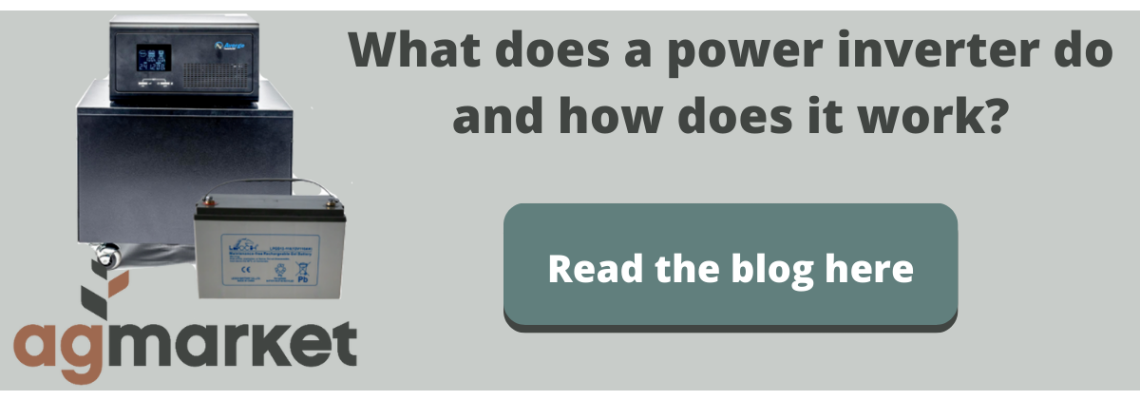What is an Inverter? | Product Education | AgBlogs

Most people
have had enough of load-shedding and are looking for reliable backup power
systems. Wisdom comes with time and we have learned which questions to ask when
looking at buying power backup systems and how to get the most out of them. In
this article, we will share some of the important factors to look at when
getting any type of backup power for your home.
What is an inverter?
We will first
start with the most basic component of the system: the inverter. An inverter is
an electrical appliance that converts DC or Direct Current voltage into AC or
Alternating current voltage.
Households
standardly use AC voltage in South Africa.
Why can't I just power my mains from a battery or solar source?
An inverter
is used to change the DC output from solar panels or batteries into an AC
current so that you can power your home appliances. DC voltage is normally much
lower than AC voltage.
How does an inverter work?
The
inverter works by producing an increase in the amplitude of the DC voltage and
hence produces a change in the frequency or strength of the current.
If you look
at the output of these inverters for your home in a graph, it presents itself
as a Sine wave which has a smooth transition between the changing direction of
the current. This produces an electrical current that is stable and strong
enough to power your appliances. Interruptions and irregular changes in this
current can harm the processing equipment by blowing out the circuits. Our
suggestion is to look for an inverter called a pure sine wave inverter. This is
the best inverter to use with sensitive technology like computers and screens
as they can easily blow a circuit if there are rapid fluctuations in the given
voltage.
While modified
sine wave inverters are also fine to use with most equipment, if you are
running sensitive and expensive equipment, you might want to invest in an
inverter with a pure or true sine wave output.
What size inverter do I need for my home?
When it
comes to which inverter is best for home use in South Africa, there are
multiple options. For just powering a light, your Wi-Fi and a TV for 2 hours,
you will need about a 1KW inverter.
A 3KW
inverter will run computers, TVs, lights, Wi-Fi and a few other appliances with
ease – This would be ideal for a small 2-bedroom home.
A 5KW
inverter will run a 3-bedroom home with all the bells and whistles easily, but
not your industrial welding machine.
All the
above depends on how much power your appliances pull. Your best course of
action is to make a list of the appliances you want to power and work out how much
power you will need.
Other very
important considerations when looking at what inverter to get are;
Which of my appliances are inverter killers?
Now we are not saying that running these appliances on an inverter will damage them in any way, but trying to run a freezer, fridge and oven on inadequate backup power will drain your batteries faster than you can say “OVERLOAD” This is because appliances that use any kind of cooling or heating element uses a lot of power and will drain your backup batteries much faster. You can find lists of roughly how much power your appliances use online and calculate how much battery backup you need for the appliances you want to run on your inverter and battery,
What batteries are best to use with an inverter?
With the
whole load-shedding business we have certainly learnt our lesson. You can use a
cheap 100-ah Deep Cycle Gel battery with your 1KW inverter. If load shedding
stays on level 2 for the rest of the year, your battery will work for a year,
but with stages 4 load shedding and up, that same battery will last only 3-6
months. Why? You ask? These gel batteries can be discharged to about 50% of their
capacity without any damage or repercussions but with stage 4 load shedding and
up, these batteries don’t have time to fully recharge after each use leading to
your next usage taking more than the recommended 50% discharge. This seriously
shortens the lifespan of these batteries.
The next
(and much more expensive) step up is the Lithium Ion battery. A 100AH Lithium
Ion battery will last twice as long as the gel but with the benefit of being
able to discharge to 20% load without harming the battery in any way. Lithium-ion
batteries are also twice as light and charge twice as fast. We highly recommend
using lithium-ion batteries in your inverter setup.
Read our Gel
VS. Lithium article in our blogs for more.
What kind of inverters can AgMarket offer?
AgMarket
offers several inverter options, from mobile inverters for your vehicle, portable power stations with their battery for
use in camping, smaller and larger units for home solar inverters and even
inverter generators. Have a look at our Power
Solutions category for more on the available products and their features.
Keeping the
lights on in your home has never been this easy. Get your backup power
solutions at competitive prices that won't knock your lights out!

